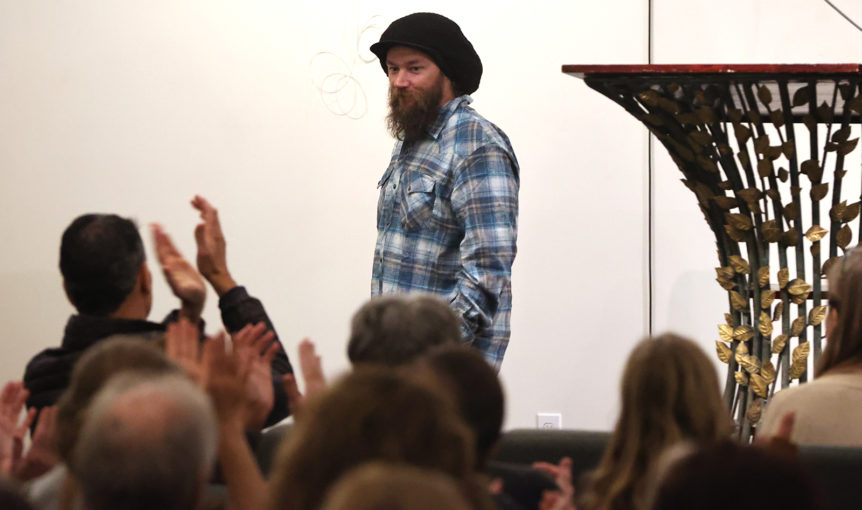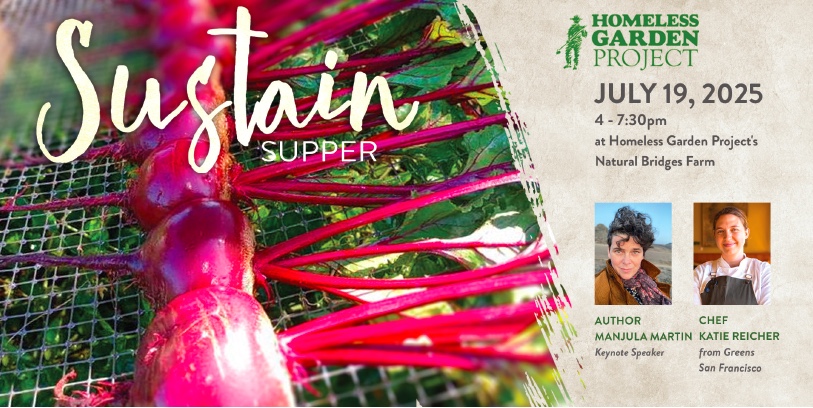Hello, my name is Doug, I have been at the Homeless Garden Project since May. I grew up on the east coast, and have a construction, and restaurant background. I moved to California about ten years ago, and even though I had experience, it was hard for me to find work. The Homeless Garden Project gets people from all different backgrounds, and on the farm we come together as a team, and we celebrate each other’s successes and accomplishments.
I have had a couple of personal accomplishments, such as being asked to lead on watering the farm, which added some extra responsibility to my normal day to day tasks. Also I was considered for the position of Production Trainee, then interviewed, I was successful and got the job. In this position I get to operate with more independence but am also stepping up as a leader on some tasks, it’s a one year commitment, and I am looking forward to learning as much as possible.
The Homeless Garden Project is an employment training program that helps people in Santa Cruz County who are experiencing homelessness, who have barriers to employment, and who wish to maintain a productive place in their community, by providing a stable place to grow. Not only as an employee, but as a person, while nourishing the mind, body and soul.
I get a sense of security through working, which allows me to keep a positive mental attitude, and this brings me peace of mind.
Having a stable income has allowed me not only to meet my basic needs but through budgeting I have been able to plan for the future. I was recently able to replace my phone when my old one broke, through my savings that wouldn’t be possible without a job. I get a sense of security through working, which allows me to keep a positive mental attitude, and this brings me peace of mind.
It all starts with a morning circle. Morning circle begins with three minutes of meditation. It’s a great time to get grounded, and set an intention for the day. Also it’s nice to experience a quiet time, we don’t always get that. On Tuesday we have a check in, and are presented with a question, such as what’s the best advice you’ve been given. The best advice I have ever been given is treat others, as you would wish to be treated. We then move on to announcements, before farm tasks are handed out for the day.
On Tuesday and Friday we harvest vegetables and flowers for our community supported agriculture recipients. We take great joy in providing the freshest possible produce, so we harvest the morning of, selecting only the best and we process on site. The cycle of life all begins with the greenhouse. Where we mix our own potting soil into which we sow the seeds of our crop to be. Once the seeds are sown they are nurtured in the greenhouse until they are mature enough to plant into our beds that we have prepared by hoeing the weeds, adding compost, and loosening the soil so the roots have room to thrive. When the beds are planted, there is lots of standard bed maintenance to do, such as hoeing the weeds, irrigating and fertilizing, also covering with row cloth to try to mitigate pest damage. Deer are a big problem and they love strawberries so to deal with them we put up a fence and now we don’t need to worry.
We are also provided a hot organic lunch, sourcing as much from the farm as possible. The hot portion being prepared by a volunteer, and the salad by rotating trainees. The food is always excellent, you can taste the love that goes into making it. Then once a week we meet with our social work intern to set goals, and work together to accomplish them. We also meet the Training and Education Supervisor every two months to go over milestones where we set goals, and go over the ones we’ve accomplished. Milestones are a trackable checklist of skills that we use to make sure we are ready for employment when we graduate.
Employers from the community make presentations to let us know what they look for in applicants, and tell us what the company is all about which may expand our job horizons. In addition we receive 14 weeks of interactive job search training and resume writing classes to help us develop our job search skills, and find employment when our training is over. This also helps in our computer literacy skills.
We learn good work ethic through the jobs we perform on the farm such as strength to persevere, reliability, dependability, and responsibility. We also gain problem solving skills by asking questions and overcoming obstacles like pest control, water management, and a constant struggle with weeds. We learn teamwork skills such as communicating, learning, and having a positive mental attitude. I get my motivation by just having my hands in the soil of an organic farm knowing that I am helping to nourish people. Just like I help to nourish the plants and help them grow in return the farm nourishes me and helps me grow.
—Doug shared this talk at HGP’s Holiday Celebration on December 1, 2022 at the Resource Center for Nonviolence.


